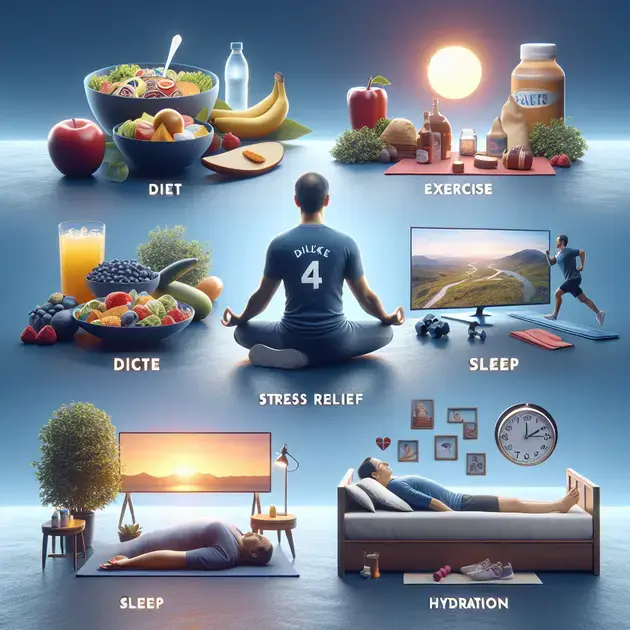Lowering your glucose readings is crucial for maintaining a healthy lifestyle, especially for individuals with diabetes. By implementing effective tips and strategies, you can successfully manage your blood sugar levels and improve your overall well-being.
With the right approach, you can make simple yet impactful changes to your daily routine that will help you lower your glucose readings and reduce the risk of complications associated with high blood sugar levels. In this post, we will explore some proven tips that can make a significant difference in managing your glucose levels effectively.

Effective Tips to Lower Your Glucose Readings Naturally
Managing your blood sugar levels is crucial for overall health. Incorporating healthy eating habits into your daily routine can have a significant impact on lowering your glucose readings naturally. Here are some effective tips to help you achieve this:
1. Focus on a Balanced Diet
One of the key steps in lowering your glucose readings is to focus on a balanced diet. Include a variety of fruits, vegetables, whole grains, lean proteins, and healthy fats in your meals. Avoid processed foods and sugary drinks, as they can cause spikes in blood sugar levels.
You can track your daily food intake and nutritional values using apps like MyFitnessPal or Lose It!. These apps provide valuable insights into your diet and can help you make healthier food choices.
2. Monitor Your Carbohydrate Intake
Carbohydrates have a direct impact on blood sugar levels. Monitor your carbohydrate intake and opt for complex carbohydrates such as whole grains, legumes, and vegetables. Limit your consumption of simple carbohydrates like white bread, pasta, and sugary snacks.
An app like CarbsControl can assist you in tracking your carbohydrate intake and managing your blood sugar levels effectively.
3. Stay Hydrated
Drinking an adequate amount of water is essential for maintaining healthy blood sugar levels. Dehydration can lead to elevated glucose readings, so make sure to stay hydrated throughout the day. Aim to drink at least 8-10 glasses of water daily.
Apps like WaterMinder or Hydro Coach can help you track your water intake and remind you to stay hydrated at regular intervals.
4. Get Sufficient Sleep
Quality sleep plays a vital role in regulating blood sugar levels. Aim to get 7-9 hours of uninterrupted sleep each night to support overall health and well-being. Establish a bedtime routine and create a comfortable sleep environment to promote restful sleep.
Apps like Sleep Cycle or Calm can assist you in improving your sleep quality and duration, ultimately benefiting your blood sugar control.
5. Manage Stress Levels
High stress levels can contribute to elevated blood sugar levels. Practice stress-reducing techniques such as meditation, deep breathing exercises, yoga, or mindfulness to keep your stress levels in check. Prioritize self-care activities and make time for relaxation.
Apps like Headspace or Calm can guide you through meditation and mindfulness practices to reduce stress and improve your overall well-being.
By incorporating these effective tips into your daily routine, you can lower your glucose readings naturally and improve your overall health and well-being.
The Importance of Regular Exercise in Managing Blood Sugar Levels
Exercise plays a crucial role in managing blood sugar levels and promoting overall health. Regular physical activity can help improve insulin sensitivity, lower blood sugar levels, and reduce the risk of complications associated with diabetes. Here are some key reasons why exercise is essential for managing blood sugar levels:
1. Increase Physical Activity
Engaging in regular physical activity, such as brisk walking, jogging, cycling, or strength training, can help lower blood sugar levels and improve insulin sensitivity. Aim for at least 150 minutes of moderate-intensity exercise per week to reap the benefits of physical activity.
Apps like Strava or Nike Training Club can provide workout plans and tracking features to help you stay motivated and on track with your exercise routine.
2. Focus on Cardiovascular Exercise
Cardiovascular exercise, such as running, swimming, or dancing, is particularly effective in managing blood sugar levels. It helps increase heart rate, improve circulation, and burn excess glucose in the bloodstream. Incorporate cardio workouts into your weekly routine for optimal blood sugar control.
An app like Couch to 5K or MapMyRun can assist you in starting a structured cardiovascular training program and tracking your progress over time.
3. Include Strength Training
Strength training exercises, such as weightlifting or bodyweight workouts, can also benefit blood sugar management. Building muscle mass can enhance insulin sensitivity and glucose uptake in the body, leading to better blood sugar control. Incorporate strength training exercises 2-3 times a week for optimal results.
Apps like MyFitnessPal or Fitbod can provide personalized strength training workouts and track your strength gains over time.
4. Stay Consistent with Your Exercise Routine
Consistency is key when it comes to managing blood sugar levels through exercise. Make physical activity a priority in your daily schedule and establish a consistent workout routine. Set achievable goals, track your progress, and adjust your exercise regimen as needed to maintain optimal blood sugar control.
An app like MyPlate or Fitbit can help you set fitness goals, track your exercise sessions, and monitor your overall physical activity levels to support blood sugar management.
5. Consult with a Healthcare Professional
Before starting any new exercise regimen, consult with a healthcare professional or a certified fitness trainer to ensure that your workout plan is safe and suitable for your individual needs. They can provide personalized recommendations based on your health status, fitness level, and blood sugar management goals.
Apps like Amwell or HealthTap allow you to consult with healthcare professionals remotely and receive expert advice on creating an exercise plan tailored to your specific health needs and goals.
By prioritizing regular exercise and incorporating a variety of physical activities into your routine, you can effectively manage your blood sugar levels and improve your overall health and well-being.

**Incorporating Mindful Stress-Relief Techniques for Better Glucose Control**
Mindful Stress-Relief Techniques
Stress is a significant factor that can impact blood sugar levels in individuals with diabetes. By incorporating mindful stress-relief techniques into your daily routine, you can better control your glucose levels and improve your overall well-being. Mindfulness practices such as meditation, deep breathing exercises, and yoga can help reduce stress hormones like cortisol, which can lead to spikes in blood sugar.
One effective technique is mindfulness meditation, where you focus on the present moment without judgment. By practicing this regularly, you can train your mind to handle stress more effectively and prevent unnecessary fluctuations in your blood sugar levels. Additionally, deep breathing exercises can promote relaxation and reduce anxiety, contributing to better glucose control.
Yoga is another beneficial stress-relief practice that combines physical movements with mindful breathing. It not only helps reduce stress but also improves circulation and flexibility, which are essential for managing diabetes. By incorporating these techniques into your daily routine, you can cultivate a sense of calm and resilience that can positively impact your glucose levels.
Furthermore, mindfulness practices can enhance your awareness of emotional triggers that may lead to stress. By recognizing these triggers, you can address them proactively and prevent them from impacting your blood sugar levels. Overall, incorporating mindful stress-relief techniques can help you achieve better glucose control and improve your quality of life.
Exploring the Benefits of Sufficient Sleep for Managing Glucose Levels
Sleep plays a crucial role in regulating blood sugar levels and overall metabolic health. Adequate and quality sleep is essential for individuals with diabetes to effectively manage their glucose levels and prevent complications. When you get sufficient sleep, your body can better regulate insulin production and utilization, leading to more stable blood sugar levels.
Research has shown that insufficient sleep can disrupt the body’s hormonal balance, making it harder to control blood sugar levels. Lack of sleep can increase insulin resistance and promote higher blood sugar levels, putting individuals with diabetes at risk of complications. By prioritizing sufficient sleep, you can support your body’s natural ability to process glucose efficiently.
Additionally, getting enough sleep is crucial for cognitive function and emotional well-being, which are important factors in maintaining a healthy lifestyle with diabetes. Sleep deprivation can impair cognitive function, making it challenging to make healthy choices and manage your condition effectively. By ensuring you get adequate rest, you can enhance your overall health and improve your glucose control.
Creating a bedtime routine and optimizing your sleep environment can help improve the quality and duration of your sleep. Avoiding electronic devices before bed, establishing a consistent sleep schedule, and creating a relaxing bedtime ritual can promote better sleep hygiene. Prioritizing sleep as a key component of your diabetes management plan can lead to better glucose control and overall well-being.
The Impact of Hydration on Blood Sugar Regulation
Hydration plays a vital role in regulating blood sugar levels and supporting overall health, especially for individuals with diabetes. Proper hydration is essential for maintaining optimal kidney function, which helps regulate blood sugar levels by removing excess glucose from the bloodstream. Dehydration can lead to higher blood sugar levels and increase the risk of complications in individuals with diabetes.
Drinking an adequate amount of water throughout the day can also aid in digestion and nutrient absorption, contributing to better blood sugar regulation. Staying hydrated helps the body process carbohydrates more efficiently, preventing spikes and crashes in blood sugar levels. By making hydration a priority, you can support your body’s natural processes and improve your glucose control.
Moreover, staying well-hydrated can help reduce cravings for sugary beverages and snacks, which can negatively impact blood sugar levels. Water is a calorie-free and sugar-free option that can quench your thirst and support healthy hydration levels. By choosing water as your primary beverage, you can avoid unnecessary sugar intake and maintain stable blood sugar levels.
To ensure adequate hydration, aim to drink at least 8-10 cups of water per day, or more if you engage in physical activity or live in a hot climate. Carry a reusable water bottle with you throughout the day as a reminder to stay hydrated. By making hydration a conscious habit, you can effectively regulate your blood sugar levels and support your overall diabetes management.
**
Conclusion
**
Incorporating mindful stress-relief techniques, such as meditation, deep breathing exercises, and yoga, into your daily routine can significantly enhance your ability to manage glucose levels and improve your overall well-being. By practicing mindfulness regularly, you can reduce stress hormones like cortisol, which can lead to blood sugar spikes. Mindfulness practices not only help in stress reduction but also cultivate a sense of calm and resilience, positively impacting your glucose control.
Prioritizing sufficient sleep is crucial for individuals with diabetes to regulate blood sugar levels effectively. Quality sleep supports insulin production and utilization, leading to more stable glucose levels. Research indicates that inadequate sleep can disrupt hormonal balance, increase insulin resistance, and elevate blood sugar levels, putting individuals at risk of complications. By establishing a bedtime routine and creating a relaxing sleep environment, you can improve sleep quality, cognitive function, and emotional well-being, contributing to better glucose control.
Hydration plays a vital role in blood sugar regulation and overall health for individuals with diabetes. Proper hydration supports kidney function in removing excess glucose from the bloodstream and aids in nutrient absorption. By staying well-hydrated and choosing water as the primary beverage, you can prevent spikes and crashes in blood sugar levels, reduce cravings for sugary drinks, and maintain stable glucose control. Aim to drink at least 8-10 cups of water per day to support your body’s natural processes and enhance your diabetes management plan.